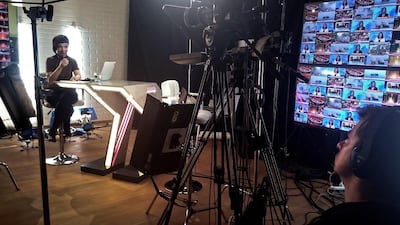Against a backdrop of flickering news images, bathed in cool white light, the anchor of Russia’s only independent TV channel, Dozhd, asks an analyst what the fall of the rouble means for ordinary Russians.
The set looks state-of-the-art, but if the camera zoomed out, viewers would see that Maria Makeyeva is sitting in a living room crisscrossed by wires and that the lights are stuck to the wall with masking tape.
Such are the conditions of independent television in today’s Russia, where questioning the official Kremlin line can spell death for a news outfit.
For the privately owned Dozhd, it has meant having to move out of a trendy loft across the river from the Kremlin to a cramped flat belonging to one of the staff.
“Our universe has shrunk ... and mostly to just news,” said Makeyeva, who is also the channel’s deputy editor.
Dozhd’s riches-to-rags transformation began in January last year, when it lost 80 per cent of its 15 million-strong audience after major cable providers dropped the station from their packages, killing most of its advertising revenue.
The ostensible reason for the move was a poll on the channel’s website asking whether Leningrad (now Saint Petersburg) should have surrendered to German forces during the Second World War rather than holding out under siege for 872 days, during which more than 800,000 people died of hunger.
Officials branded the poll unpatriotic, with the Russian President Vladimir Putin’s spokesman declaring that the network – which apologised for the poll – had “crossed the line”.
Many observers agree, however, that the channel is being punished for going boldly where pro-Kremlin channels fear to tread by, for example, giving a voice to Putin’s opponents and interviewing Russian soldiers captured in Ukraine after Moscow had denied sending troops across the border.
In March, the owner of Dozhd’s studio space ordered the channel to move out by the end of the year, a deadline that was then moved forward to October. Dozhd moved to an adjacent space rented from a magazine owned by the billionaire Mikhail Prokhorov, but was asked again to leave after only two months.
At the same time, the network’s funding sources were drying up after Russian lawmakers passed a law banning cable channels from running adverts.
Dozhd launched a campaign to boost its subscriber base, amassing eight million viewers from the effort.
“Their main goal, as I see it, is to make our demise look like it was brought on by economic factors, so that no political factors are evident,” Makeyeva says.
Dozhd’s influence is relatively small, but observers say its existence challenges the staple diet of militant, pro-government fare served up by state media since the start of the crisis in Ukraine.
“Dozhd has provided an alternative to Kremlin-controlled federal TV channels by focusing on news content and giving a platform to opposition voices,” the New York-based Committee to Protect Journalists said last month, bestowing its International Press Freedom Award to Dozhd’s editor-in-chief, Mikhail Zygar.
The official scrutiny to which Dozhd is subjected contrasts with the disregard shown towards heavily biased or fabricated stories on state media.
Months after running a report claiming Ukrainian troops had crucified a child, the state-run Channel One admitted it did “not have proof” of the alleged atrocity.
“It seems that, right now, absolute unanimity is needed by the Kremlin”, says the free-speech campaigner Alexei Simonov, who called the pressure on Dozhd “the last stage” in a state-orchestrated purge of the media.
That process has included the overhaul of the state-owned RIA-Novosti agency, the ousting of editors from at least two independent news websites and a new law that severely limits foreign ownership of media outlets.
The focus of pro-government channels on “ideological warfare and state propaganda” led the simple act of reporting the news to be considered as “an act of sabotage”, Makeyeva says.
She hopes that Dozhd will eventually be able to move from its current home, where staff have to squeeze past an antique piano, reports are frequently interrupted by the din of traffic and suspicious men loiter outside. “The flat is being watched,” she says.
Viewers watching Dozhd could be fooled, however, into thinking all is well.
Dozhd journalists attended Putin’s annual press conference this week, Zygar interviewed the Russian prime minister Dmitry Medvedev and the former finance minister Alexei Kudrin visited the studio to be interviewed.
With that kind of access to people in power, it’s hard to convince Russians that Dozhd is struggling.
“On air you can’t really tell,” Makeyeva admits.

